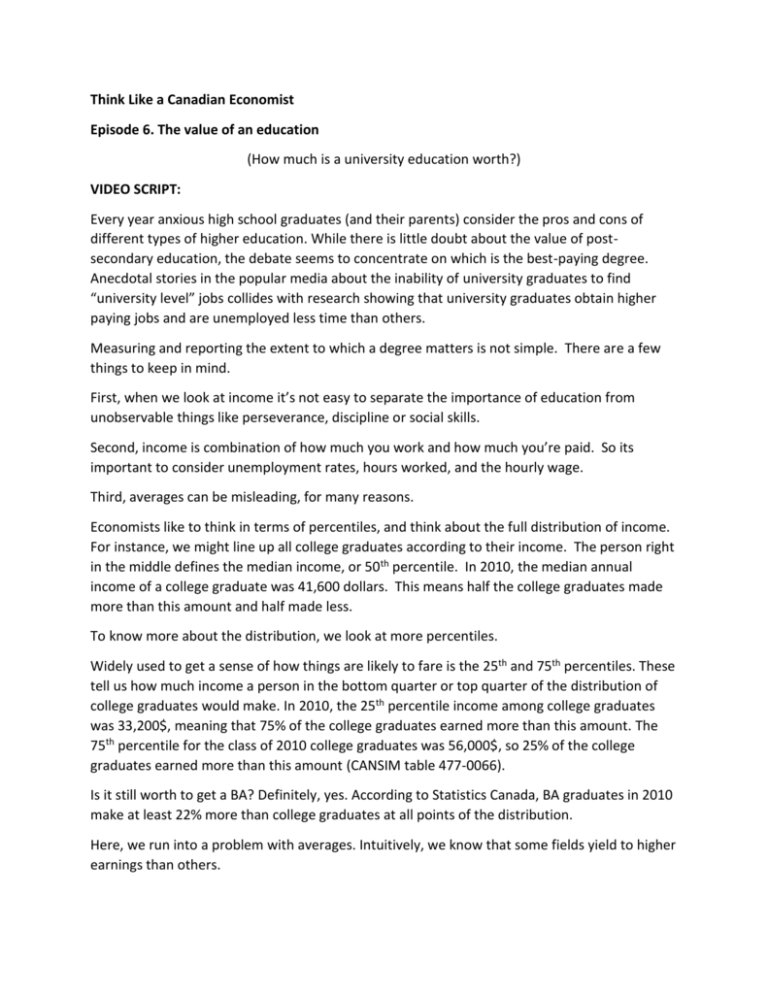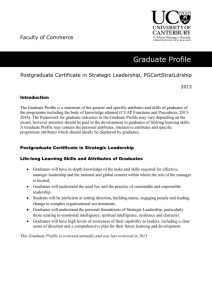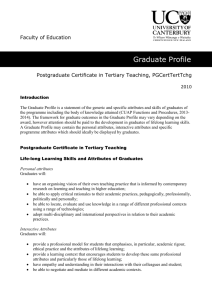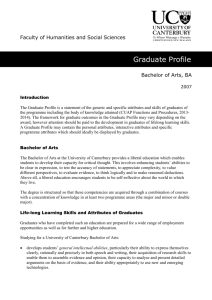Script - lcerpa
advertisement

Think Like a Canadian Economist Episode 6. The value of an education (How much is a university education worth?) VIDEO SCRIPT: Every year anxious high school graduates (and their parents) consider the pros and cons of different types of higher education. While there is little doubt about the value of postsecondary education, the debate seems to concentrate on which is the best-paying degree. Anecdotal stories in the popular media about the inability of university graduates to find “university level” jobs collides with research showing that university graduates obtain higher paying jobs and are unemployed less time than others. Measuring and reporting the extent to which a degree matters is not simple. There are a few things to keep in mind. First, when we look at income it’s not easy to separate the importance of education from unobservable things like perseverance, discipline or social skills. Second, income is combination of how much you work and how much you’re paid. So its important to consider unemployment rates, hours worked, and the hourly wage. Third, averages can be misleading, for many reasons. Economists like to think in terms of percentiles, and think about the full distribution of income. For instance, we might line up all college graduates according to their income. The person right in the middle defines the median income, or 50th percentile. In 2010, the median annual income of a college graduate was 41,600 dollars. This means half the college graduates made more than this amount and half made less. To know more about the distribution, we look at more percentiles. Widely used to get a sense of how things are likely to fare is the 25th and 75th percentiles. These tell us how much income a person in the bottom quarter or top quarter of the distribution of college graduates would make. In 2010, the 25th percentile income among college graduates was 33,200$, meaning that 75% of the college graduates earned more than this amount. The 75th percentile for the class of 2010 college graduates was 56,000$, so 25% of the college graduates earned more than this amount (CANSIM table 477-0066). Is it still worth to get a BA? Definitely, yes. According to Statistics Canada, BA graduates in 2010 make at least 22% more than college graduates at all points of the distribution. Here, we run into a problem with averages. Intuitively, we know that some fields yield to higher earnings than others. A recent study worked out the total earnings reported by graduates in different fields over the course of 19 years. Over their careers, the median BA graduate made more - or the same- amount of money than the median college graduate in all fields of study. The dashed line at 1 indicates the point at which a BA and a college degree yield the same amount of money to the median earner. Women with a BA make more than women with college degrees in all fields (up to twice as much in the field of Education and at least 35% in Engineering and Health). The highest university payoff for men is in Life Sciences and the lowest is in Fine Arts and Social Sciences, where both types of graduates earn the same. Check out the cumulative income by field of study for men with a BA. As a reference, compare each field to the last group of bars, which show the average for all fields of study. The importance of avoiding averages is quite obvious in this graph: Business, Engineering, Health and Math and Physics have the largest cumulative incomes at all points, whereas Education, Fine Arts, Social sciences, Humanities and Life Sciences fare below. Some fields are more unequal than others. For instance, Humanities, Business and Fine Arts, show large difference between what the top 25% and the median graduate makes. If you think about the difference between the top 25 and the bottom 25 of the distribution of graduates as reflecting the impact of the unobserved factors mentioned before, these are more important in fields like Fine Arts, or Humanities. Women earn generally less than men, particularly when considering their lifetime earnings. University degrees also close the differences in pay between men and women. This is likely because most of the earning advantage of men in college degrees comes from jobs in construction and resources which attract few women. Most fields offer good prospects to BA women who are at the 75-th percentile (or top 25%). However, compared to men, there are more fields where being at the 25th percentile implies low earnings (around 24,000 a year). Like for men, Fine Arts, and Humanities (and not so far behind Engineering) offer the greatest variability of income, and correspond to fields were unobserved factors count more. All figures from economic studies, like these presented here, show some kind of average that omits the fact that some graduates can certainly fall outside this range of earnings for a variety of reasons. These exceptions are the basis of the anecdotal evidence that also informs the debate about the value of education. The above numbers tell you that BA graduates are likely to earn more than college graduates, and even more in business and engineering. Looking at the distribution of income also helps to realize that things Economists cannot measure, like discipline or social skills, also affect the income of graduates at all levels and in all fields. What is the value of a university education? It can be quite high, but it is certainly not guaranteed. To learn more, follow us on twitter @tlcecon and visit our website for more videos. SUGGESTED REFERENCES: Yuri Ostrovsky and Marc Frenette, “The Cumulative Earnings of Postsecondary Graduates Over 20 Years: Results by Field of Study” Economic Insights, no. 040, October 2014, Statistics Canada, Catalogue no. 11-626-X. College graduate incomes: Statistics Canada CANSIM table 477-0066







